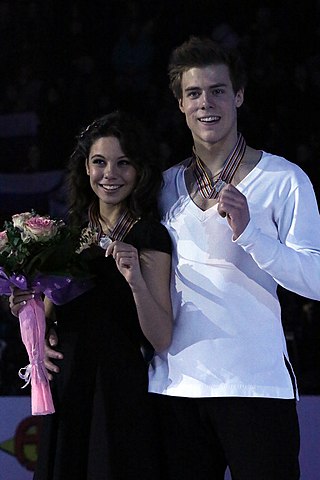
The World Figure Skating Championships, commonly referred to as "Worlds", are an annual figure skating competition sanctioned by the International Skating Union. Medals are awarded in men's singles, women's singles, pair skating, and ice dance. Generally held in March, the World Championships are considered to be the most prestigious of the ISU Figure Skating Championships. With the exception of the Olympic title, a world title is considered to be the highest competitive achievement in figure skating.

The International Skating Union (ISU) is the international governing body for competitive ice skating disciplines, including figure skating, synchronized skating, speed skating, and short track speed skating. It was founded in Scheveningen, Netherlands, in July 1892, making it one of the oldest international sport federations. The ISU was formed to establish standardized international rules and regulations for the skating disciplines it governs, and to organize international competitions in these disciplines. It is now based in Switzerland.

The European Figure Skating Championships are an annual figure skating competition in which figure skaters compete for the title of European champion. Medals are awarded in men's singles, women's singles, pair skating, and ice dance. The event is sanctioned by the International Skating Union (ISU) and is the sport's oldest competition. The first European Championships were held in 1891 in Hamburg, Germany, and featured one segment, compulsory figures, with seven competitors. They have been held continuously since 1891, with only five interruptions, and have been sanctioned by the ISU since 1893. Women were allowed to compete for the first time in 1930, which is also the first time pair skating was added to the competition. Ice dance was added in 1954. Only eligible skaters from ISU member countries in Europe are allowed to compete.

The World Junior Figure Skating Championships, commonly referred to as "World Juniors" or "Junior Worlds", are annual figure skating competitions sanctioned by the International Skating Union in which figure skaters within a designated age range compete for the titles of World Junior Champion.
The figure skating season is the period of time in which competitions are contested in the sport of figure skating. The skating season begins on July 1 of one year and lasts until June 30 of the next year, thus spanning a full 12 months. The seasons are referred to by the years they span; for example, the 2017–18 figure skating season began in July 2017 and ended in June 2018.
The 1892 European Figure Skating Championships were held on January 24. Elite figure skaters competed for the title of European Champion in the category of men's singles. The competitors performed only compulsory figures.

The 2012 European Figure Skating Championships was an international figure skating competition in the 2011–12 season. The event determined the European Champions in men's singles, ladies singles, pair skating, and ice dancing. The competition was held from 23 to 29 January 2012 in Sheffield, Great Britain.
The 1983 European Figure Skating Championships was a senior-level international competition held in Dortmund, West Germany from February 1 to 6, 1983. Elite skaters from European ISU member nations competed in the disciplines of men's singles, ladies' singles, pair skating, and ice dancing.
The 1969 European Figure Skating Championships were held at the Olympia-Eisstadion in Garmisch-Partenkirchen, West Germany. Elite senior-level figure skaters from European ISU member nations competed for the title of European Champion in the disciplines of men's singles, ladies' singles, pair skating, and ice dancing.
The 1953 European Figure Skating Championships were held in Dortmund, West Germany from 22 to 25 January. Elite senior-level figure skaters from European ISU member nations competed for the title of European Champion in the disciplines of men's singles, ladies' singles, and pair skating.
The 1951 European Figure Skating Championships were held in Zürich, Switzerland from February 2 to 4. Elite senior-level figure skaters from European ISU member nations competed for the title of European Champion in the disciplines of men's singles, ladies' singles, and pair skating.
The 1947 European Figure Skating Championships were held in Davos, Switzerland from January 31 to February 2. Elite senior-level figure skaters from European ISU member nations, in addition to the United States, Canada, and Australia, competed for the title of European Champion in the disciplines of men's singles, ladies' singles, and pair skating. Athletes from Germany and Austria were not admitted. Austrian skaters Eva Pawlik and Edi Rada probably would have won medals. Barbara Ann Scott is the only winner from outside Europe in ladies' singles.
The 1936 European Figure Skating Championships were held in Berlin, Germany. Elite senior-level figure skaters from European ISU member nations, as well as Japan, competed for the title of European Championin the disciplines of men's singles, ladies' singles, and pair skating.
The 1930 European Figure Skating Championships were held in Berlin, Germany. Elite senior-level figure skaters from European ISU member nations competed for the title of European Champion in the disciplines of men's singles, for the first time ladies' singles, and pair skating.

The 2013 European Figure Skating Championships was a senior international figure skating competition in the 2012–13 season. The competition was held from 23 to 27 January 2013 at the Dom Sportova in Zagreb, Croatia. Medals were awarded in the disciplines of men's singles, ladies' singles, pair skating, and ice dancing.
The 2014 European Figure Skating Championships was a senior international figure skating competition in the 2013–14 season. The competition was held in Budapest, Hungary from January 13 to 19th, 2014. Skaters competed in the disciplines of men's singles, ladies' singles, pair skating, and ice dancing.
The 2015 European Figure Skating Championships were held 26 January – 1 February 2015 in Stockholm, Sweden. Medals were awarded in the disciplines of men's singles, ladies' singles, pairs, and ice dancing.
The 2016 European Figure Skating Championships were held 25–31 January 2016 in Bratislava, Slovakia. Medals were awarded in the disciplines of men's singles, ladies' singles, pairs, and ice dancing.

The 2018 European Figure Skating Championships were held in January 2018 in Moscow, Russia. Medals were awarded in the disciplines of men's singles, ladies' singles, pairs, and ice dance.

The 2020 European Figure Skating Championships were held in Graz, Austria, on 20–26 January 2020. Medals were awarded in the disciplines of men's singles, ladies' singles, pairs, and ice dance. The competition determined the entry quotas for each federation at the 2021 European Championships.





